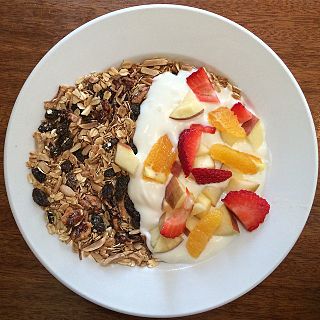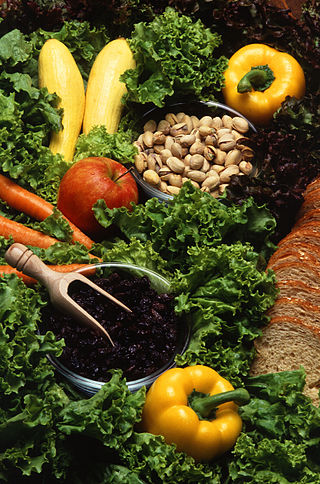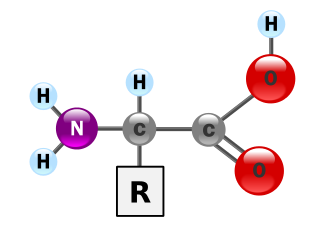
The pistachio, a member of the cashew family, is a small to medium tree originating in Persia. The tree produces seeds that are widely consumed as food. The word can be countable or uncountable, meaning its plural is with or without an 's'.

Nutella is a brand of brown, sweetened hazelnut cocoa spread. Nutella is manufactured by the Italian company Ferrero and was introduced in 1964, although its first iteration dates to 1963.

The soybean, soy bean, or soya bean is a species of legume native to East Asia, widely grown for its edible bean, which has numerous uses.

In botany, a nut is a fruit from a tree consisting of a hard or tough nutshell protecting a kernel which is usually edible. The shell is indehiscent, meaning it does not open to release the seed. Most seeds come from fruits that naturally free themselves from the shell, but this is not the case in nuts such as hazelnuts, chestnuts, and acorns, which have hard shell walls and originate from a compound ovary.

Textured or texturized vegetable protein (TVP), also known as textured soy protein (TSP), soy meat, or soya chunks, is a defatted soy flour product, a by-product of extracting soybean oil. It is often used as a meat analogue or meat extender. It is quick to cook, with a protein content comparable to some meats.

Granola is a food consisting of rolled oats, nuts, seeds, honey or other sweeteners such as brown sugar, and sometimes puffed rice, that is usually baked until crisp, toasted and golden brown. The mixture is stirred while baking to avoid burning and to maintain a loose breakfast cereal consistency. Dried fruit, such as raisins and dates, and confections such as chocolate are sometimes added. Granola is often eaten in combination with yogurt, honey, fresh fruit, milk or other forms of cereal. It also serves as a topping for various pastries, desserts or ice cream. Muesli is similar to granola, except that it is traditionally neither sweetened nor baked.

A food allergy is an abnormal immune response to food. The symptoms of the allergic reaction may range from mild to severe. They may include itchiness, swelling of the tongue, vomiting, diarrhea, hives, trouble breathing, or low blood pressure. This typically occurs within minutes to several hours of exposure. When the symptoms are severe, it is known as anaphylaxis. A food intolerance and food poisoning are separate conditions, not due to an immune response.

Vegetarian nutrition is the set of health-related challenges and advantages of vegetarian diets.

Douhua is a Chinese sweet or savoury snack made with silken tofu. It is also referred to as doufuhua, tofu pudding, soybean pudding or, particularly in northern China, tofu brains.

Soy allergy is a type of food allergy. It is a hypersensitivity to ingesting compounds in soy, causing an overreaction of the immune system, typically with physical symptoms, such as gastrointestinal discomfort, respiratory distress, or a skin reaction. Soy is among the eight most common foods inducing allergic reactions in children and adults. It has a prevalence of about 0.3% in the general population.

Milk allergy is an adverse immune reaction to one or more proteins in cow's milk. Symptoms may take hours to days to manifest, with symptoms including atopic dermatitis, inflammation of the esophagus, enteropathy involving the small intestine and proctocolitis involving the rectum and colon. However, rapid anaphylaxis is possible, a potentially life-threatening condition that requires treatment with epinephrine, among other measures.

Diet for a Small Planet is a 1971 book by Frances Moore Lappé. It was a bestseller in the West, and argues for the potential role of soy as a superior form of protein. It demonstrates the environmental impact of meat production and a contributor to global food scarcity. She argued for environmental vegetarianism—practising a vegetarian lifestyle out of concerns over animal-based industries and the production of animal-based products.

Proteins are essential nutrients for the human body. They are one of the building blocks of body tissue and can also serve as a fuel source. As a fuel, proteins provide as much energy density as carbohydrates: 17 kJ per gram; in contrast, lipids provide 37 kJ per gram. The most important aspect and defining characteristic of protein from a nutritional standpoint is its amino acid composition.

Soy protein is a protein that is isolated from soybean. It is made from soybean meal that has been dehulled and defatted. Dehulled and defatted soybeans are processed into three kinds of high protein commercial products: soy flour, concentrates, and isolates. Soy protein isolate has been used since 1959 in foods for its functional properties.

Solae LLC was an international soy ingredients supplier based in St. Louis, Missouri. Solae was formed as a joint venture between DuPont and Bunge Limited. On May 1, 2012, Solae announced that DuPont had acquired Bunge's 28% share, thus taking full ownership of the company. DuPont then merged Solae's business into Danisco.

Vegetarian Diet Pyramid is a nutrition guide that represents a traditional healthy vegetarian diet. Variations of this traditional healthy vegetarian diet exist throughout the world, particularly in parts of North America, Europe, South America and, most notably, Asia. Given these carefully defined parameters, the phrase "Traditional Vegetarian Diet" is used here to represent the healthy traditional ovo-lacto vegetarian diets of these regions and peoples. A pyramid was created by Oldways Preservation Trust in 1998 with scientific research from Cornell and Harvard University and specific reference to the healthy patterns of eating demonstrated by the Mediterranean Diet Pyramid.

Tofu is a food prepared by coagulating soy milk and then pressing the resulting curds into solid white blocks of varying softness: silken, soft, firm, extra firm. Tofu is translated as bean curd in English. Tofu originated in China and has been consumed in the country for over 2,000 years. Tofu is a traditional component of many East Asian and Southeast Asian cuisines; in modern Western cooking, it is often used as a meat substitute.
The Food Allergen Labeling and Consumer Protection Act (FALCPA) is a United States law that requires all food labels in the United States to list ingredients that may cause allergic reactions and was effective as of January 1, 2006. While many ingredients can trigger a food allergy, this legislation only specifies the eight major food allergens. This law was passed largely due to the efforts of organizations such as the Food Allergy & Anaphylaxis Network (FAAN).

Vegan cheese is a category of non-dairy, plant-based cheese analogues. Vegan cheeses range from soft fresh cheeses to aged and cultured hard grateable cheeses like plant-based Parmesan. The defining characteristic of vegan cheese is the exclusion of all animal products.

Hemp protein is a plant-derived protein from the cannabis plant and is isolated from hemp seeds.




















